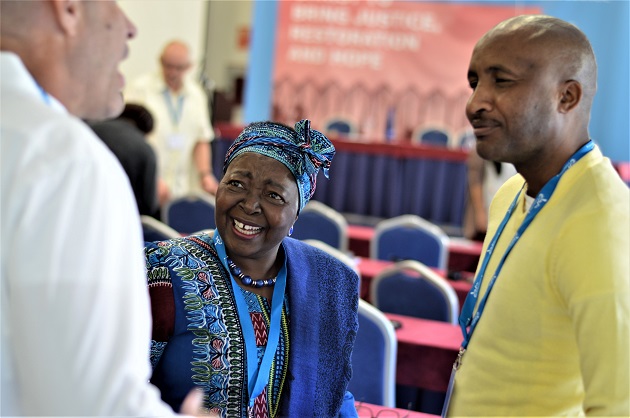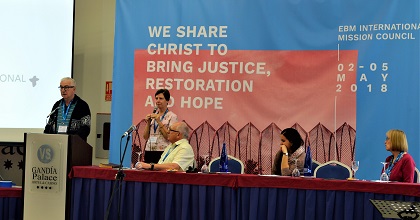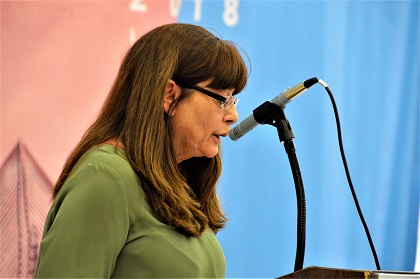About 160 representatives from four continents met for the EBM International Mission Council. “We are servants of God, his disciples and his ambassadors”.
 The EBM International Mission Council gahtered 160 Christian workers from four continents. / J. Torrents
The EBM International Mission Council gahtered 160 Christian workers from four continents. / J. Torrents
“For what we preach is not ourselves, but Jesus Christ as Lord, and ourselves as your servants for Jesus sake”. With this verse as a motto, the Mission Council of the European Baptist Mission (EBM) International met in Gandía (Spain) between May 2 and 5.
More than 160 representatives from four continents attended.
A council of this kind touches on many areas of work, but the most important is sharing of the purpose of extending the kingdom of God, exploring how we can be more efficient in mission, and sharing challenges, experiences, resources and friendship with people from all over the world.
 The EBM International gathering was held in Gandia, Spain. / J. Torrents
The EBM International gathering was held in Gandia, Spain. / J. TorrentsEBM International is the mission agency of European Baptists, with projects in Africa, India, Turkey and Latin America. In this international gathering, delegates from the countries where the projects are carried out also participated.
EBM was born in a distant 1954 with work exclusively in Africa, which was extended to Latin America in 1979, to India in 2009 and, in 2011, in Turkey.
.jpg) Canuto Ngui Ondo (Guinea). / J. Torrents
Canuto Ngui Ondo (Guinea). / J. TorrentsCurrently, it manages more than 300 projects in 15 countries and has more than a hundred Christian workers. The countries are: Cuba, Peru, Bolivia, Brazil, Argentina, India, Turkey, Malawi, Mozambique, Cameroon, South Africa, Sierra Leone, Equatorial Guinea, Central African Republic and Zambia.
The council, which lasted for four days, allowed to carry out administrative tasks such as budgets and the review and approval of positions, combined with moments of growth thanks to different biblical studies and preaching.
The participations were numerous, but we have compiled a few ideas that were shared in those days.
420.jpg) Daniel González (Cuba). / J. Torrents
Daniel González (Cuba). / J. TorrentsDaniel González (coordinator of the EBM missionary work in Cuba): “The church is not structures, it is people connected with God”
González explained that the great protagonist of the missionary work in his country is, in reality, “God himself”. “In Cuba we have experienced the same thing, the call of God, and that is what moves us”. The main project is based on planting churches.
“In Cuba you do not need a church, a built-up place, with a backyard you can begin a ‘church’ like La Perla project, which emerged from the church of Santo Suarez. Is a movement on the whole island, working with children at risk”.
González explained that all projects should be based on this foundation, with local churches facilitating the connection of a cultural contextualization of the gospel message. Of course, bearing in mind that “there is no church development without a confrontation with the kingdom of darkness”.
yCristpohHaus.jpg) Christoph Haus (Germany, right) and Jorge Pérez (Spain). / J. Torrents
Christoph Haus (Germany, right) and Jorge Pérez (Spain). / J. TorrentsChristoph Haus (Germany, General Secretary of EBM International): “We do not receive public funds because then we would have to be neutral confessionally, and we are not. We still have the challenge of reaching millions of people who do not know the gospel, as well as of remaining witnesses in situations like, for example, those of children at risk”.
Elvira Jardines (Cuba, worked as a missionary in Equatorial Guinea): “In the United States, for example, we can talk about children who do not receive attention, yes, but in a context like that of Equatorial Guinea, we have some deeper needs. In Talita Cum (Evinayong) and El Buen Pastor (Malabo) schools we can offer tools for a better future. Our provision, therefore, includes education, values, nutrition and health prevention”.
 Paloma Ludeña (Spain). / J. Torrents
Paloma Ludeña (Spain). / J. TorrentsPaloma Ludeña (Spain, served as a missionary in Equatorial Guinea): “We are servants of God, his disciples and his ambassadors. When we speak of children at risk there are three words that should define our work: vision, compassion and action”.
Helle Liht (Estonia, European Baptist Federation): “The Word invites us to welcome the foreigner and to share the Gospel with him. When we talk about the reality of refugees, we ask ourselves what to do when they come, but the correct question should be: What should we do when they are among us? By opening ourselves to them, cities and churches can be transformed”.
The council gathering was also used to present the most important lines of strategy and structure of EBM International for the period 2018-2022. Identity was defined from a vision that is “to share the transforming love of God so that people live in hope", and with five central areas of work: development and planting of churches, children at risk , health care, growth capacity (empower people to build sustainable lives) and support in case of natural disasters.

Las opiniones vertidas por nuestros colaboradores se realizan a nivel personal, pudiendo coincidir o no con la postura de la dirección de Protestante Digital.
Si quieres comentar o